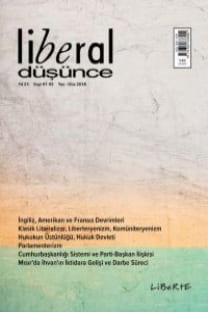Locke ve Hume’da Mülkiyet Kavramı: Karşılaştırmalı bir Analiz
Mülkiyet, Locke, Hume, Liberalizm
Locke and Hume on Property: A Comparative Study
Property Locke, Hume, LiberalisProperty, Liberalism,
___
- CHERNO, Melvin, “Locke on Property: A Reappraisal”, Ethics, Chicago 1957, Cilt: 68, Sayı: 1, s. 51-55.
- COHEN, Jerry, Lectures on the History of Moral and Political Philosophy, Princeton University Press, New Jersey 2014.
- DAY, J.P, “Locke on Property”, The Philosophical Quarterly, 1966, Cilt: 16 Sayı: 64, s. 207-220.
- HUME, David, “A Treatise of Human Nature, “David Hume: A Treatise of Human Nature” (Second Edition), Oxford 1896.
- LOCKE, John, “Second Treatise of Government”, John Locke: Two Treatises of Government, England 1689.
- MACK, Eric, “The Natural Right of Property”, Social Philosophy and Policy, Sayı: 27, Arizona 2010, s. 53-78.
- NEILSON, Francis, “Locke’s Essays on Property and Natural Law”, The American Journal of Economics and Sociology, 1951, Cilt: 10, Sayı: .3, s. 269-83.
- PANCHIAS, George, “Hume’s Theory of Property”, Hume and Law, ed.: Mackinnon, Ashgate 2012, s. 225-239.
- RAPACZYNSKI, Andrzej, “Locke’s Conception of Property and the Principle of Sufficient Reason” Journal of the History of Ideas, 1981, Cilt: 42, Sayı. 2, s. 305-315.
- RUSSELL, Hardin, David Hume-Moral and Political Theorist, Oxford 2007, s. 144-154.
- WOTTON, David, Modern Political Thought, Hackett Publishing Company, Cambridge M.A 2008.
- ISSN: 1300-8781
- Başlangıç: 1996
- Yayıncı: Liberte Yayınları
Başörtülü Kadının Ne Kadar “Kapalı” Olduğunun Sorunsallaştırılması Üzerine
Friedrich Hayek’in Darwinci Muhafazakârlığı
Cumhurbaşkanlığı Hükümet Sisteminde Milletvekili Seçim Sistemi Önerileri
Locke ve Hume’da Mülkiyet Kavramı: Karşılaştırmalı bir Analiz
Erken Dönem Cumhuriyet’te Ahmet Ağaoğlu’nun Kemalizm’i Liberal Perspektiften Yorumlama Çalışmaları
15 Temmuz Askeri Darbe Girişiminin Türkiye-Avrupa Birliği İlişkilerine Etkisi
Social Justice in Islam and in the Political Philosophy of John Rawls
